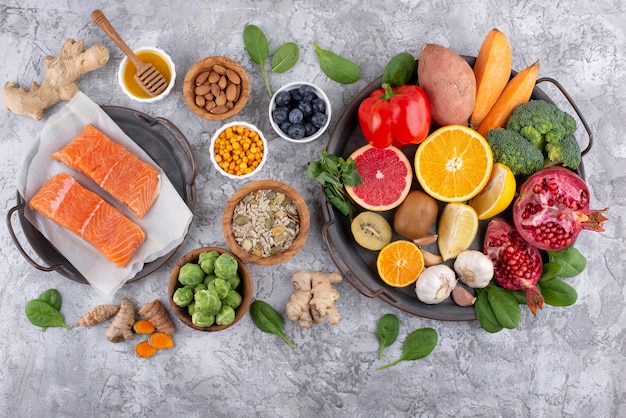Fiber and the digestive system have a strong connection. It improves the system by keeping everything moving and working smoothly. It helps form soft, bulky stool, supports regular bowel movements, and feeds the good bacteria in your gut. Most people know fiber is important, but few understand how deeply it affects overall digestive health daily.
A healthy digestive system depends on getting enough fiber from your food. Without it, problems like constipation, bloating, and even long-term issues such as diverticulosis and poor gut bacteria balance can develop.
In this guide, you will learn how fiber works inside your body, the best foods to eat for fiber, and easy tips to get more of it in your diet. Everything here is simple, practical, and focused on helping you protect your gut for good.
What Is Fiber
Fiber is a type of carbohydrate that the body cannot digest. It passes through the digestive system mostly unchanged, yet it plays a key role in digestive health. There are two main types of fiber: soluble and insoluble. Each offers unique benefits for your digestive system.
- Soluble Fiber: It dissolves in water and forms a gel-like substance. This helps slow digestion and positively affects your blood sugar levels and cholesterol. Foods like oats, apples, and beans are excellent sources of soluble fiber.
- Insoluble Fiber: It does not dissolve in water and helps add bulk to stool. This helps move food and waste through the system more efficiently. Foods rich in insoluble fiber include whole grains, vegetables, and nuts.
Why Fiber is Important for Digestive Health
Fiber is incredibly important for digestive health because it helps maintain regular bowel movements and supports gut health. Regular fiber intake can prevent digestive problems such as constipation, irritable bowel syndrome (IBS), and diverticulosis.
Key Benefits of Fiber for Digestion
Here are some key benefits of fiber for digestion health:
- Prevents Constipation: Insoluble fiber adds bulk to stool, which makes it easier to pass through the intestines and prevents constipation.
- Supports Gut Health: Fiber is food for good gut bacteria and promotes a balanced microbiome, which is essential for digestion, nutrient absorption, and immune health.
- Reduces the Risk of Digestive Disorders: Consuming fiber regularly reduces the risk of developing digestive disorders like diverticulosis and inflammatory bowel diseases, including Crohn’s disease.
Top Fiber-Rich Foods for Better Digestion
Eating fiber-rich foods is essential for maintaining digestive health. Here are some foods that provide a high amount of fiber:
- Fruits and Vegetables: Apples, pears, berries, carrots, and broccoli
- Legumes: Lentils, chickpeas, and beans
- Whole Grains: Oats, barley, quinoa, and brown rice
- Nuts and Seeds: Almonds, chia seeds, and flaxseeds
Here’s a quick breakdown of fiber content in some common foods:
| Food | Fiber Content (per 100g) |
| Apple | 2.4 grams |
| Carrot | 2.8 grams |
| Lentils (cooked) | 7.9 grams |
| Oats (uncooked) | 10.6 grams |
| Almonds | 12.5 grams |
Including these foods in your diet will help you reach your fiber goals and support your digestive health effectively.
Tips for Increasing Fiber Intake
To increase your fiber intake daily, consider these practical tips:
- Try high-fiber breakfast options like oatmeal or whole-grain toast.
- Keep fruits like apples or nuts like almonds handy for a fiber boost.
- Opt for whole-grain bread, pasta, and rice instead of refined versions.
- Include beans in soups, stews, or salads for a fiber-packed meal.
- Many fruits and vegetables have high fiber content in their skins—think apples and potatoes.
These small changes can make a big difference in your fiber intake and, by extension, your digestive health.
Fiber and Digestive Disorders
Fiber lowers the risk of digestive disorders by keeping your gut clean, regular, and strong. Eating enough fiber every day helps your body push out waste faster, reduce pressure in the colon, and avoid painful gut problems.
Below are three common digestive issues where fiber makes a clear difference.
1. Irritable Bowel Syndrome (IBS)
Irritable Bowel Syndrome is a condition where the gut becomes sensitive, and fiber helps calm that sensitivity. People with IBS often feel bloated, get cramps, and have irregular bathroom habits. Soluble fiber helps by softening stool and making bowel movements easier to manage. Good choices for this fiber include oats, bananas, and peeled apples.
2. Diverticulosis
Diverticulosis happens when small pockets form in the colon’s wall, and fiber prevents that by keeping stool moving. When stool moves slowly or becomes hard, pressure builds up in the colon. That pressure causes these small pockets to appear. Insoluble fiber keeps stool bulky and soft, stopping the pressure from rising.
3. Colon Cancer Prevention
Colon cancer risk goes down when fiber keeps your colon clean and moving. When waste sits in the colon too long, it can release harmful substances that damage cells. Fiber speeds up the time waste spends in your gut, lowering this risk. Foods like whole grains, berries, and leafy greens protect your colon and support long-term health.
Frequently Asked Questions (FAQs)
Why do we need fiber if we can’t digest it?
We need fiber because it helps the body move food and waste through the digestive system. Even though fiber isn’t digested, it keeps stools soft and regular. It also feeds healthy gut bacteria, which support overall digestion.
What is the role of dietary fiber in the gastrointestinal system?
Dietary fiber keeps the gastrointestinal system clean, balanced, and moving. It adds bulk to stool, prevents constipation, and supports healthy bacteria in the gut. Both soluble and insoluble fiber work together to protect digestive function.
Does fiber speed up digestion?
Fiber helps digestion move at the right speed—not too fast and not too slow. Insoluble fiber adds bulk and pushes waste out quickly, while soluble fiber slows things down when needed. This balance keeps digestion smooth and regular.
Conclusion
Fiber keeps your digestive system working the way it should—smooth, regular, and balanced. It helps prevent constipation, feeds good gut bacteria, and lowers the risk of serious digestive problems like IBS, diverticulosis, and colon cancer.
A fiber-rich diet supports gut health with simple everyday foods. Adding more fruits, vegetables, whole grains, legumes, nuts, and seeds is an easy way to reach your daily fiber goals and keep your gut healthy long-term.






